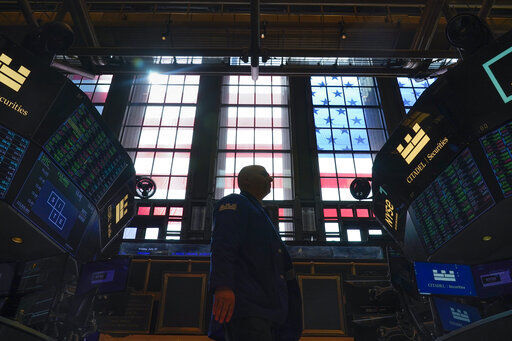Stocks on Wall Street closed lower Tuesday as investors brace for a big week of news on inflation and company earnings reports. The S&P 500 fell 0.9%, the Dow Jones Industrial Average slid 0.6% and the Nasdaq lost 0.9%. Big companies are beginning to report their latest quarterly results this week. PepsiCo’s profits easily beat analysts’ estimates. Major banks including JP Morgan Chase are on tap later this week. Crude oil prices fell sharply. Bond yields continued flashing a warning signal about a possible recession. The yield on the 10-year Treasury slid to 2.96%.
THIS IS A BREAKING NEWS UPDATE. AP’s earlier story follows below.
Stocks on Wall Street turned broadly lower in afternoon trading Tuesday as investors brace for a big week of news on inflation and company earnings reports.
The S&P 500 was down 1.1%, with all of its 11 company sectors in the red. The benchmark index was on pace for its third straight decline after shedding an early 0.5% gain.
The Dow Jones Industrial Average fell 230 points, or 0.7%, at 31,942, while the Nasdaq was 1.3% lower.
Technology, health care and energy stocks accounted for a big share of the S&P 500’s losses. Pricey values for technology stocks tend to push the broader market higher or lower. Microsoft fell 3.2%.
Energy prices fell broadly, weighing on energy stocks. The price of U.S. crude oil slumped 7.9%, settling at $95.84 per barrel. Hess fell 3.4%.
Travel-related companies bucked the broader market decline. United Airlines climbed 7.3%, American Airlines jumped 9.6% and cruise line operator Carnival rose 6.4%.
Clothing company Gap fell 4.7% after announcing that CEO Sonia Syngal is stepping down from her role after two years on the job.
Stock indexes are off to a downbeat couple of days this week after a rare winning week. Investors remain worries about the possibility the economy will tip into a recession as the Federal Reserve jacks up interest rates to tackle the highest inflation in four decades. Higher interest rates can squelch inflatoin, but also can choke economic growth and weigh on all kinds of investments.
Against this backdrop, big companies are set to report their latest quarterly results over the next few weeks. Investors will be focused on earnings as they try to determine just how much damage pervasive inflation is inflicting on consumers and businesses.
Expectations for second-quarter results appear subdued. Analysts are forecasting 5.1% growth for companies across the S&P 500, which would be the weakest since the end of 2020, according to FactSet.
“We’ll get more color in the next couple of weeks about how the economy is shaping up, through the lens of companies,” Terry Sandven, chief equity strategist at U.S. Bank Wealth Management.
Soft drink and snack maker PepsiCo slipped 0.5% Tuesday after releasing a profit report that easily beat analysts’ estimates.
Delta Air Lines will report its latest results on Wednesday and provide more insight into the travel industry’s recovery from the pandemic. Major banks including JPMorgan Chase and Citigroup are on tap later this week.
The key concerns on Wall Street remain inflation and whether aggressive rate hikes from the Federal Reserve will push the economy into a recession. Investors have had to deal with a turbulent market over the last several months because of those concerns. Major indexes have often swung wildly between gains and losses on any given day and remain in a broad slump.
“The multitude of crosscurrents in the market place suggest that caution is warranted,” Sandven said. Inflation jumped as the economy recovered from the pandemic and demand for goods outpaced supplies. But, inflation heated up in February after Russia invaded Ukraine and sparked a jump in energy prices. Supply chain problems have worsened as China locks down cities in an effort to contain new COVID-19 cases.
The Fed is raising rates in an effort to slow economic growth to help temper the impact from rising inflation. But, the economy is already slowing down as consumers ease up on spending and Wall Street is worried that interest rate hikes could go too far and bring on a recession.
In the bond market, a warning signal continued to flash about a possible recession. The yield on the 10-year Treasury slid to 2.95% from 2.98% late Monday. It remains below the two-year Treasury yield, which fell to 3.03%. Such a thing doesn’t occur often, and some investors see it as a sign that a recession may hit in the next year or two.
Wall Street is keeping a close watch on any indicator that could signal inflation is easing. The Labor Department on Wednesday will release its June report on consumer prices, following with a Thursday release of its June report on prices directly impacting businesses.


